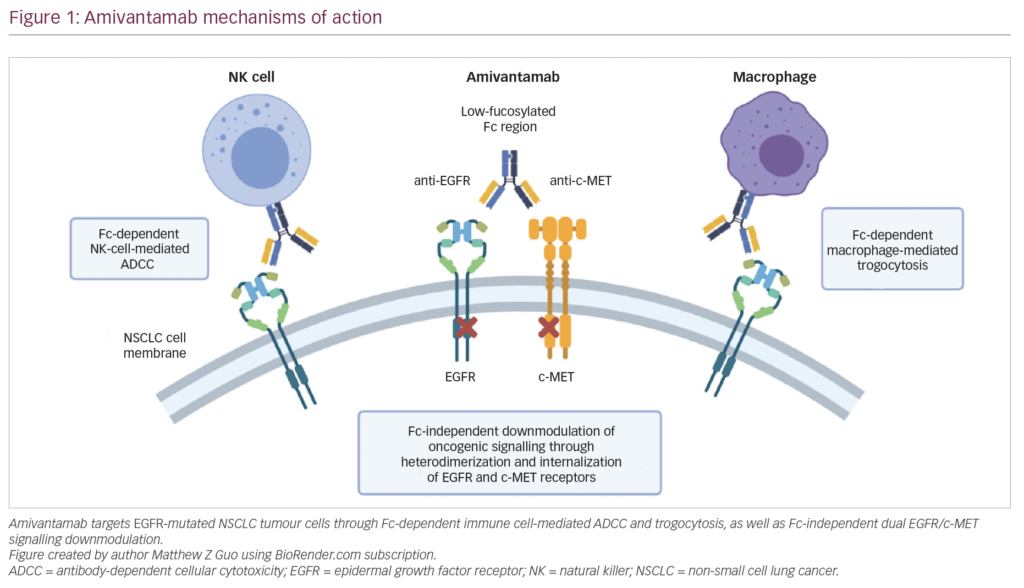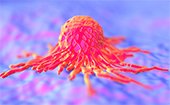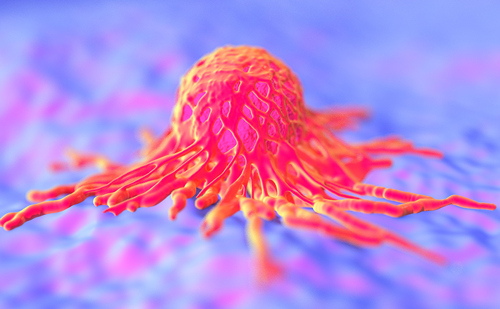Lung cancer is the leading cause of cancer-related mortality in the US, with 219,440 new cases of lung cancer diagnosed in 2009.1 According to the US National Cancer Institute (NCI), it is estimated that there will be 222,520 new cases and 157,300 deaths from lung cancer (nonsmall- cell and small-cell combined) in the US in 2010.2 The five-year relative survival rate for patients with lung cancer for the period 1995–2001 was 15.7%. This rate varies markedly depending on the stage at diagnosis, from 49 to 16 to 2% for patients with local, regional and distant disease, respectively.3
Approximately 85% of the estimated 1.39 million new lung cancer cases annually worldwide are non-small-cell lung cancer (NSCLC).This form of lung cancer progresses rapidly and has a very low cure rate, highlighting the large unmet need for better management of NSCLC.
The advent of the era of personalised medicine is bringing with it opportunities to implement new and improved ways to better diagnose and treat cancer. Human epidermal growth factor receptor 2 (HER2) testing pioneered the use of Herceptin® as targeted therapy for breast cancer, and the Human Genome Project opened the way for the research and development of innovative molecular tests for a variety of cancers. Thus, the trend in modern molecular oncology is to move away from a ‘one size fits all’ approach to targeted therapy. A key component of this strategy is tailoring treatment based on analysis of the molecular profile of the individual patient’s tumour. The implementation of personalised medicine for the treatment of NSCLC has been made possible by several convergent factors:
- The development and licensing of ‘targeted therapy’ drugs. Gefitinib (Iressa®) and erlotinib (Tarceva®) are two epidermal growth factor receptor tyrosine kinase inhibitor (EGFR-TKI) drugs used to treat NSCLC.
- Research and development into suitable molecular tests such as those used for EGFR mutational tests and others that provide objective ways to test for potential response to treatment with these drugs.
- The significant input of influential government bodies, advisory groups and task forces, as well as private organisations and cancer advocacy groups, into driving acceptance and implementation of personalised medicine. These include the US Food and Drug Administration (FDA), the National Cancer Coalition Network (NCCN), the American Society of Clinical Oncology (ASCO), the Personalized Medicine Coalition (PMC), the Association of Molecular Pathology (AMP) and the College of American Pathologists (CAP), the latter having formed its first personalised medicine committee in 2009.
In the Laboratory
Biologic Pathways
When EGF, as well as several other ligands, occupies EGFR sites, it activates a signalling pathway cascade through the downstream effectors of the mitogen-activated protein kinase (MAPK) pathway. These effectors (KRAS, BRAF, extracellular signal regulated kinase [ERK] and MAPK) influence cellular proliferation, adhesion, angiogenesis, migration and survival. Other EGFR-mediated pathways include the signal transducer and activator of transcription and the phosphoinositide-3-kinase (P13K)/AKT signalling pathway (STAT) (see Figure 1).
The EGFR-signalling pathway has risen to prominence in the world of oncology largely as a result of the development of drugs that target this pathway. Blocking EGFR with drugs such as gefitinib (Iressa) or erlotinib (Tarceva) blocks all downstream effects of this receptor and is the basis for activity of these therapeutic agents.
There are several other signalling pathways controlling regulation of cellular function that are outside the scope of this article. These include KRAS mutations and others that may also play a role in NSCLC. In addition, pharmaceutical companies are developing drugs that have other mechanisms of action and targets, such as those targeting the fusion gene EML4–ALK.4
Methodology Matters
Molecular tests are typically requested by oncologists or by their local pathology laboratory, and may be ordered as part of an initial work-up of particular cancers or performed on patients who are not responding to chemotherapy. Most hospital-based or smaller independent laboratories send the testing out to third-party reference laboratories because it is not generally feasible for them to perform these complex, highly interpreted molecular tests in-house.
The choice of technology platform and interpretive capability are important factors in the performance of these tests that must be taken into account. These molecular tests are most often performed using genomic DNA extracted from formalin-fixed, paraffin-embedded (FFPE) tissue samples. There are currently several technically and clinically well-validated methodologies available for these determinations. Realtime polymerase chain reaction (PCR) is a robust tool for molecular testing and can be adapted both to genotyping for detecting particular mutant sequences and to quantitative measurement of specific messenger RNA (mRNA) levels. In situ estimates of protein levels in cells are measurable using immunohistochemistry (IHC) staining. It should be noted that elevated EGFR levels determined by IHC have not been shown to correlate with clinical utility. Although IHC positivity may have a role in the research setting for predicting progression-free survival (PFS) within an EGFR-mutated subset of patients, these tests are not independently informative.5 Clinicians and their local pathology laboratories should therefore be cognisant of what methods are being used if they are sending molecular oncology tests to a third-party reference laboratory.
NSCLC is a heterogeneous aggregate of histologies. The most common histologies are squamous carcinoma, adenocarcinoma and large-cell carcinoma. These histologies were often classified together because approaches to diagnosis, staging, prognosis and treatment were similar. However, in recent years clinical trials have revealed critical interactions between some of the new therapeutic agents and histological sub-classifications of NSCLC. The choice of drugs is therefore partially reliant on histological distinctions that define specific therapies. For example, pemetrexed (Alimta®) and bevacizumab (Avastin®) are two drugs that are generally effective and indicated for NSCLC other than squamous carcinoma.6 Therefore, interpretation of molecular tests that are used to guide therapeutic decisions requires cognisance of the histological sub classifications.7,8 As always, laboratory tests that are used as an aid to selection of appropriate drug therapy should be used in conjunction with clinical and other findings.
Pharmaceutical Clinical Trials Perspective
The Iressa Pan Asia Study (IPASS) was an open-label, randomised, parallel-group study conducted by Mok et al. in 2008 that assessed the efficacy, safety and tolerability of gefitinib (Iressa) versus carboplatin/ paclitaxel as first-line treatment in a clinically selected population of patients from Asia. The primary end-point of IPASS was PFS, with the objective of demonstrating that gefitinib was at least as good as carboplatin/ paclitaxel doublet chemotherapy.
The study exceeded its primary objective and demonstrated superiority of gefitinib relative to carboplatin/paclitaxel in terms of PFS and overall response rate (ORR), specifically in patients who were EGFR-mutant-positive. The IPASS study thus established the utility of EGFR-TKI therapy in NSCLC patients. EGFR mutational testing was shown to provide the tools needed to objectively assess the clinical utility of gefitinib for treatment of NSCLC, because statistically different survival rates were shown to be based on whether or not EFGR mutations were present in the tumours that were treated.9
In addition to IPASS, several other clinical trials correlating response to gefitinib or erlotinib with the presence of EGFR mutations were reported at the 2009 13th World Lung Cancer Conference in San Francisco (see Table 1). It has become increasingly clear that response rates differ depending on the exon in which the EGFR mutation occurs.
EGFR mutational testing is gaining traction in the pharmaceutical industry. Partly as a result of the outcomes of clinical studies in which EGFR testing played a key role, several drug firms are exploring pharmacogenomic strategies to personalise NSCLC treatments. AstraZeneca is currently paying for genetic testing for UK patients who are being considered for treatment with Iressa. Thereafter, the National Institute of Health and Clinical Excellence will appraise the cost effectiveness of the drug.10
After a 2005 study showed that Iressa had low efficacy in the general NSCLC population, AstraZeneca withdrew its application in the EU. The company re-applied for marketing approval in 2008 with efficacy data in EGFR-positive patients, and in 2009 the drug was approved for marketing in Europe as a treatment for locally advanced or metastatic NSCLC patients whose tumours exhibit EGFR mutations. Around the time AstraZeneca withdrew its application in the EU, the FDA restricted marketing of Iressa to new patients. The company has not announced plans to pursue relabelling the drug with a companion test in the US.11
However, molecular tests such as EGFR mutational analysis have shown their value as useful ways to demonstrate achievement of end-point objectives in clinical trials, and this has sparked interest in their potential to link to the drugs as companion diagnostics.
The FDA encourages companies to link drug/diagnostic partnerships as early as possible in the development cycle of a drug. Additionally, with an eye towards advancing genomically guided personalized medicine products, the FDA is aligning its drug and diagnostics divisions to allow for simultaneous review of the drug and its companion diagnostic.12
Insights into Treatment Guidelines for Epidermal Growth Factor Receptor Tyrosine Kinase Inhibitors in Non-small-cell Lung Cancer
An Update Committee of ASCO reviewed the literature and made recommendations.13 One hundred and sixty-two publications met the inclusion criteria and the recommendations were based on treatment strategies that improve overall survival.
A key message concerning EGFR-TKI drugs is that the first-line use of gefitinib may be recommended for patients with known EGFR mutations. However, if the EGFR mutational status is negative or unknown, cytotoxic chemotherapy is preferred.
Data on the usefulness of EGFR mutational testing as a prospective tool in NSCLC treatment decisions are evolving. A recently published large, multicentre study of EGFR mutation screening in patients with NSCLC demonstrated that prospective mutation analysis can identify a population with an erlotinib response rate of 70%.14
A combined survival analysis of prospective trials of gefitinib monotherapy versus chemotherapy as first-line therapy in patients with EGFR mutations demonstrated a significant improvement in PFS in patients receiving gefitinib.15
Prognostic Utility of Epidermal Growth Factor Receptor (EGFR) Mutational Testing in Patients Who Are Not on EGFR-inhibitor Drugs
EGFR mutational testing is usually requested primarily for determining potential response to EGFR-inhibitor drugs. Interestingly, several studies have suggested that even in the absence of EGFR-inhibitor therapy, NSCLC patients with EGFR-positive mutant tumours have a better prognosis than patients with wild-type tumours.16–19
Cost-effectiveness of Molecular Testing to Personalise an Individual Patient’s Treatment
The economic value of a well-implemented personalised medicine strategy is based on the assumption that performing relatively inexpensive tests that demonstrate that a specific expensive drug is unlikely to work on a given patient’s tumour will save the overall healthcare industry the high cost of unnecessary and/or ineffective drugs. In addition, considerable cost savings could be realised by not having to manage the many potential side effects and adverse reactions linked to these drugs.
Challenges
Integration of molecular testing into the practice of medicine is not without its challenges. Broad acceptance and adoption is a long-term process. Ongoing research and continuing accumulation of data showing convincing evidence of clinical utility are key elements in gaining wider acceptance of the implementation of personalized medicine and associated molecular oncology tests.
On the laboratory side, high-complexity molecular testing in oncology requires very specialised technical knowledge and skill and a high degree of interpretative capability. Regulatory bodies such as the FDA are increasingly concerned about ensuring that there is sufficient oversight of laboratories that perform these tests.
From a clinical perspective, because these tests can have such a strong influence on treatment decisions, there is a need to ensure that clinicians have a thorough understanding of how best to use the information obtained from molecular testing of the tumours of their patients. To this end, physician education, starting as early as medical school and continuing thereafter, will play a vital role in driving and increasing large-scale understanding and acceptance of molecular oncology tests and their role in personalised medicine for the treatment of cancer.
In terms of reimbursement, the medical insurance industry is a mixed bag at present, with many insurance companies recognising the cost–benefit advantages and clinical utility, and paying for these tests, while others deny claims.
Take-home Messages
EGFR mutational tests are scientifically validated molecular tests for enabling personalised medicine. These tests provide actionable, objective diagnostic results, leading to better outcomes, as NSCLC patients with certain EGFR mutations benefit from treatment with EGFR-TKI drugs such as gefitinib or erlotinib. EGFR mutational status may additionally be useful as a prognostic marker to help determine potential survival irrespective of whether or not the patient is treated with an EGFR-inhibitor drug.
Guidelines for the practice of personalised medicine and associated molecular testing have been issued by organisations such as the FDA, NCCN and ASCO. Although not yet mandated standard of care in the US, as it is in some countries, there is growing support for implementation from regulatory authorities and other organisations.
Significant amounts of money could be saved for the healthcare industry as the cost of a molecular test is far less than the cost of an unnecessary drug being prescribed, not to mention the additional extra costs related to adverse reactions, side effects and associated hospitalisation.
Demand for molecular testing as a means to personalising therapy continues to gain momentum. Innovative diagnostic and therapeutic advances are continuing to be made, offering the potential to improve patient care and bringing new hope to the cancer patient. ■













